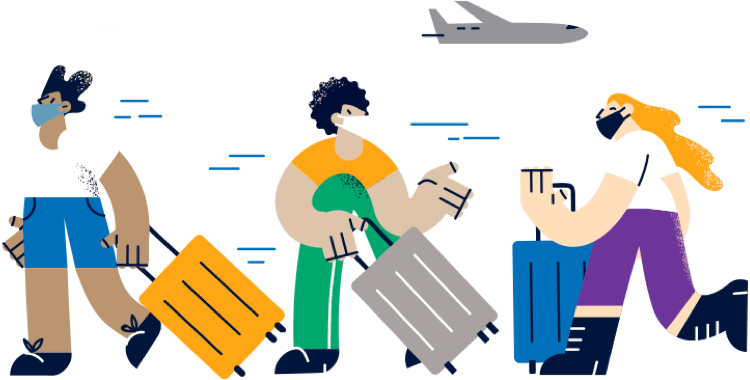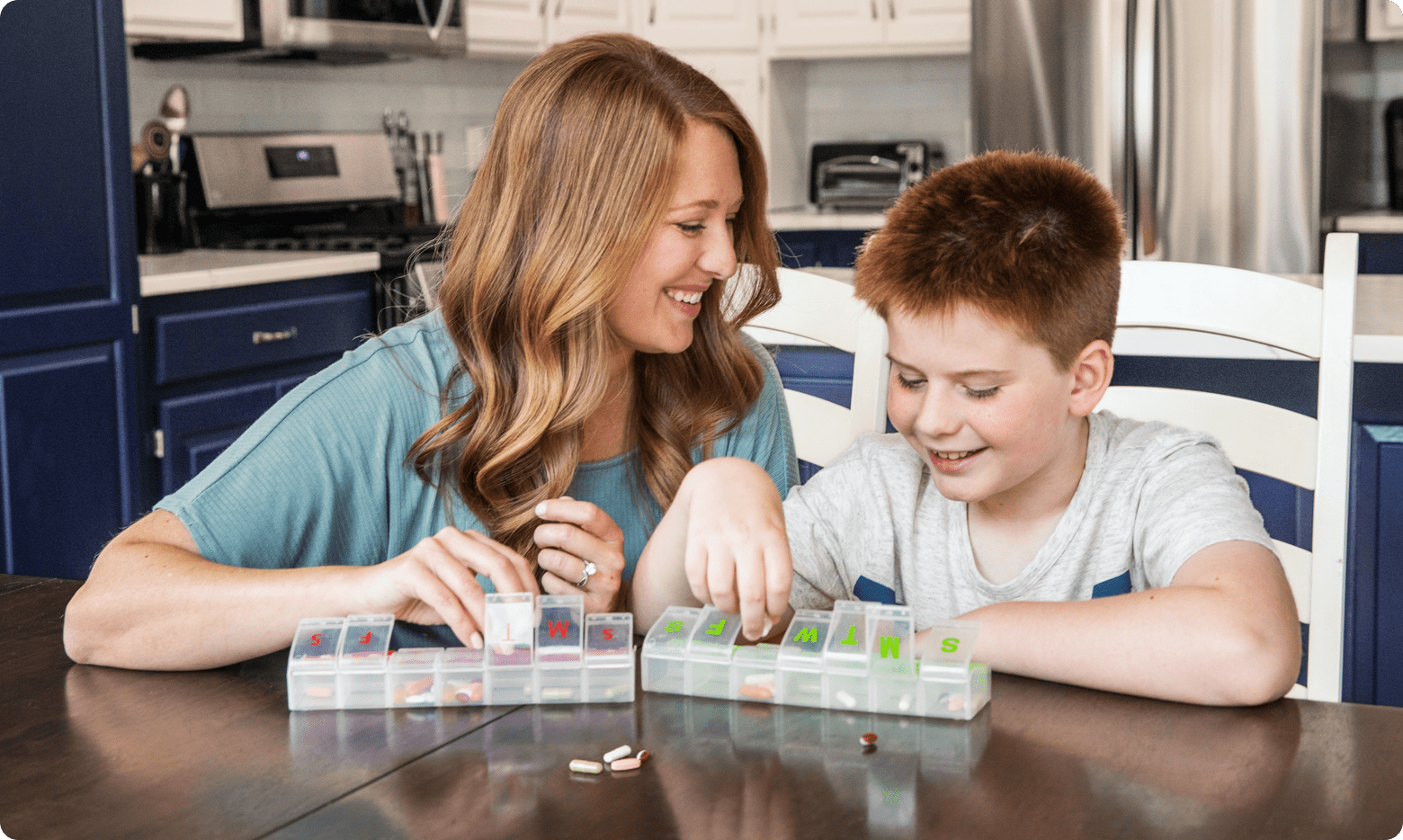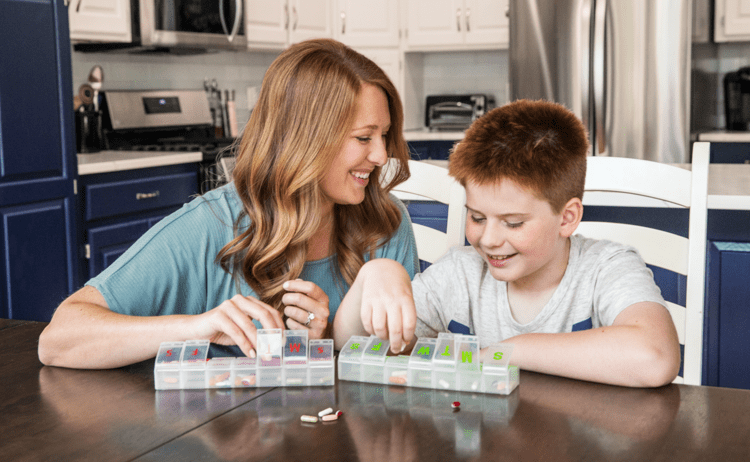Staying one step ahead
- Write a checklist of all the items you need to pack and any action items you need to complete before heading out
- Work with your CF care team to create an itinerary that aligns with your treatment schedule and make sure you have everything you need from them for your trip
- On the road: Identify CF Centers in the area you’re visiting, and if you’re driving far, plan your route so you know where they are along the way
- In the air: If you are flying and are nervous about packing certain medications or equipment, consider having a doctor’s note on hand stating that your prescription medications are a medical necessity
-
- This may be helpful if there are questions during airport check-in, security, the flight itself, and when you’re going through customs if you’re traveling internationally
- Traveling with oxygen? That may require separate documentation. Check with your airline for specifics
When you're that far away you can't just run home and grab something you forgot, so checklists are important.
–Jen, a caregiver of a young adult with CF

Travel 101
Taking a trip should be a fun and exciting time! Be your own best advocate by carving out time in your itinerary for rest, medication breaks, and other activities that are part of your normal routine and keep you feeling your best.
Prescription prep
- Schedule refills with plenty of time to spare ahead of your planned travel
- Make sure medicines are labeled
- Bring an extra supply of medicine just in case there are delays getting home
- Look into ways to store any refrigerated medicines
- This could mean calling the hotel to make sure a refrigerator is in the room or keeping a cooler in the car during a long ride
- When flying, talk to the flight attendants and ask if there is a refrigerator you can use while in the air


Amber, a mom with CF, with son Oliver.
Pack up and go
- Pack a separate bag for medical supplies so they’re easy to find
-
- When flying, store your medicines in your carry-on to avoid lost luggage fiascos
- Grab some extra high-calorie and high-fat snacks that are travel-safe
- Bring back-up nebulizers
-
- Include an adapter when traveling abroad to ensure they are compatible with foreign plugs
- Consider getting a travel cart so any heavy or bulky supplies are in one place and easier to transport
We make that hotel room the same as our house would be. We take my medicine, we take my vest, we have these little portable steam bags that go in the microwave to sterilize my medicine cups.
–Michael, an athlete living with CF

Travel 101
It can be hard to stay on top of your treatment routine when you’re out and about. To help make it a little easier, consider setting phone reminders for the same time each day or try using a health app or journal like this one to keep you on track.
Become a pro at avoiding germs and viruses
On top of regular worries about germs, traveling can feel dicey at times due to concerns about periodic spikes in certain viruses. These are some ways to help get yourself from Point A to Point B while keeping your health and safety in mind.
Stay up-to-date on vaccinations
Certain destinations may require you to be up-to-date on particular vaccinations. Talk to your CF care team to see if these vaccines are right for you and when you should get them before traveling.
Mask up
Wearing a mask, especially on flights or in crowded spaces, is one way to help protect yourself from airborne germs.
Wash your hands
Clean hands can help keep you healthy. But are you washing them the right way? Make sure to lather up and scrub for at least 20 seconds. That includes in between your fingers and under your fingernails.
Don’t get tired out, plan your route
If you’re worried about fatigue, jet lag, or other impacts of traveling, plan your trip accordingly. Pick a driving route with plenty of places to stop, or avoid splitting up long flights into smaller ones that might require fast and stressful trips between gates. If you are flying, leave yourself plenty of time to get to the airport so you can relax while you wait.
Avoid high-flying germs
Wiping down your seat and tray with disinfectant wipes and wearing your mask can go a long way at 30,000 feet.
Think before you drink
Choose a drink with an unbroken seal if you’re unsure about the cleanliness of what’s available from the tap or soda fountain. When in doubt, keep a sports drink in your bag for a great source of electrolytes.
Bottled or distilled water is also a great solution for cleaning nebulizers or other medical gear when traveling abroad (as long as it’s followed by proper disinfection).
Be aware of what’s in the air
Some destinations might have lower air quality than you’re used to. Check online beforehand and be ready to mask up or spend time indoors if you see a high smog alert.

Be prepared with travel insurance
It’s very important to know what kind of travel insurance you’re getting. Confirm that it covers your specific needs. Does your policy provide coverage for pre-existing conditions? Does it have restrictions in place regarding medication adjustments or doctors' visits within a certain time frame before departure? Be thorough when choosing a policy.
Don't forget your on-the-go travel guide!
If you’re worried this may be too much to remember, you can bring your own personalized travel guide that can fit right into your carry-on. From a customizable packing list and emergency contact list to handy packing tips, you’ll always be prepared for CF-conscientious adventures.
